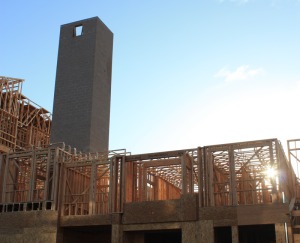The latest to question the urban-planning mantra that densification makes housing more affordable is none other than Richard Florida, who is famous for telling cities they need to attract the creative class. In an article in CityLab, Florida cites new research by MIT planner Yonah Freemark that finds that rezoning neighborhoods for denser housing may actually make housing less affordable.

There is an ongoing debate between so-called YIMBYs (Yes in My Backyard) who want to make housing more affordable by “building up” and those who want to “build out,” i.e., build low-density housing on the fringes of existing urban areas. The YIMBYs claim that residents of single-family neighborhoods who resist densification are racists and are keeping housing unaffordable. But the evidence shows that dense housing is more expensive and therefore can’t make housing more affordable.
Freemark’s analysis of upzoning in Chicago finds that it leads developers to replace low-cost existing housing with luxury multifamily housing. The result is increased prices. While the laws of supply and demand suggest that an increasing supply of housing would make housing more affordable in the long run, Freemark found that upzoning did not lead to an increase in the number of housing units built; it just influenced where they were built.
Florida also cites free-market economist Tyler Cowan, who agrees that “high-density, vertical building doesn’t really make cities cheaper” and that “landowners will capture a big chunk of the benefits.” Florida himself had previously written that denser zoning may simply lead developers to “use the land not for affordable units but for luxury construction.”
![]() Yet in blaming developers and landowners, Florida, Cowan, and Freemark miss the key point: density is expensive. Land in dense central cities is massively more expensive than land in low-density suburbs. Per square foot construction costs of buildings taller than two stores is much greater than one- and two-story construction.
Yet in blaming developers and landowners, Florida, Cowan, and Freemark miss the key point: density is expensive. Land in dense central cities is massively more expensive than land in low-density suburbs. Per square foot construction costs of buildings taller than two stores is much greater than one- and two-story construction.
It’s a realtor rule of thumb that the cost of housing tends to be a fairly constant multiple of the cost of the land. This means that density isn’t expensive because of greedy developers. Instead, the reverse is true: developers build expensive housing in dense areas because only the wealthy can afford to live in those areas.
The solution is to make land less expensive. The only way to do that is to abolish constraints on the development of land outside the existing urban area. In California, Oregon, and Washington, this means abolishing state-wide urban-growth boundaries. In New England states, where the county level of government has been largely abandoned, it may mean taking land-use authority away from townships. In Colorado, it means, among other things, abolishing the metro Denver area’s regional urban-growth boundary (starts on page 15), established by the Denver Regional Council of Governments (DRCOG).
Whatever the specific remedy, the key is to have an abundant supply of vacant land available for housing and other development.
Randal O’Toole directs the Transportation Policy Center at the Independence Institute, a free market think tank in Denver. A version of this first appeared in his blog, The Antiplanner.


